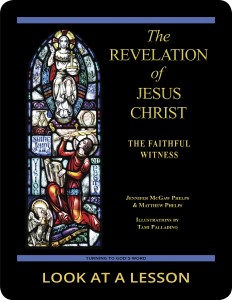bind / loose
 In the Gospel According to Matthew 18:18 (NABRE), Jesus says to his disciples “Amen, I say to you, whatever you bind on earth shall be bound in heaven, and whatever you loose on earth shall be loosed in heaven.” A lot has been made of this important statement. As we reflect on it, it is helpful to keep in mind the core sense of what Jesus says here.
In the Gospel According to Matthew 18:18 (NABRE), Jesus says to his disciples “Amen, I say to you, whatever you bind on earth shall be bound in heaven, and whatever you loose on earth shall be loosed in heaven.” A lot has been made of this important statement. As we reflect on it, it is helpful to keep in mind the core sense of what Jesus says here.
The Greek words translated as bind and loose are δέω (deo) and λύω (luo). In this context, the base meanings of “tie up” and “loose” or “untie” seem to be applicable, especially in the context of restraint or captivity. As we read this passage, then, an important question to ask ourselves in what Jesus thinks can be tied up or untied.
It seems from context as though the Church has the ability to control who is free and who is a captive both on earth and much more significantly in heaven. Likely the most crucial element here is that the Church on earth holds judicial authority in any capacity that is also applicable in heaven. This is a shocking idea both from the perspective that the Church can bind those who seem free and perhaps even more so from the point of view that the Church can free those who are bound. This is a profound statement on the role and power of the Church on earth.
you also may like our study of the book of Revelation
 The Revelation of Jesus Christ: The Faithful Witness, a 23-lesson Catholic Bible study with an imprimatur, examines ways in which our traditional Christian view of heaven is built on Hebrew apocalyptic visions recorded in the Old Testament. This recently revised study includes maps and additional commentary and takes a close look at the role of the prophets in present-day Christianity. Illustrations by Tami Palladino depict the often-misunderstood images in the book of Revelation. Click on the book’s cover to view a sample lesson.
The Revelation of Jesus Christ: The Faithful Witness, a 23-lesson Catholic Bible study with an imprimatur, examines ways in which our traditional Christian view of heaven is built on Hebrew apocalyptic visions recorded in the Old Testament. This recently revised study includes maps and additional commentary and takes a close look at the role of the prophets in present-day Christianity. Illustrations by Tami Palladino depict the often-misunderstood images in the book of Revelation. Click on the book’s cover to view a sample lesson.
 Click on the picture of the statue of Moses with horns (above) to learn more about Lost in Translation. A new entry is archived each Monday. Contact us to receive Lost in Translation by email every week. You may use any of the contact links on our website to ask Matthew a question.
Click on the picture of the statue of Moses with horns (above) to learn more about Lost in Translation. A new entry is archived each Monday. Contact us to receive Lost in Translation by email every week. You may use any of the contact links on our website to ask Matthew a question.
